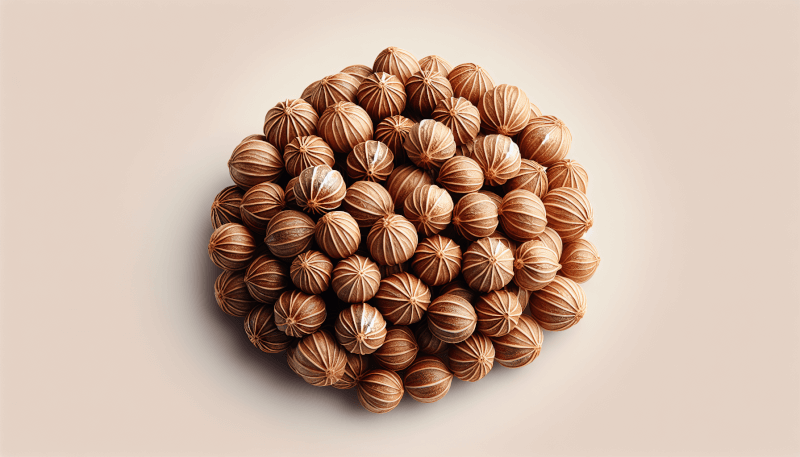Coriander seeds, also known as cilantro seeds or dhania, often find themselves at home in our spice racks. But have you ever wondered if you can actually eat them? Well, the good news is, yes, you can! These tiny, aromatic seeds not only enhance the flavor of dishes but also come with a host of health benefits. From aiding digestion to providing essential nutrients, coriander seeds are a versatile addition to your culinary repertoire. So, grab a handful of these flavorful seeds and let’s explore the world of coriander together.
What are coriander seeds?
Introduction to coriander seeds
Coriander seeds, also known as cilantro seeds or dhaniya seeds, are the dried fruit of the coriander plant. These small, round seeds are native to regions of Southern Europe, Northern Africa, and Southwest Asia. They have been used for centuries in various cuisines around the world and are known for their unique flavor and aroma.
Appearance and flavor of coriander seeds
Coriander seeds are small and spherical, with a light brown color. They have a slightly ridged outer surface and a nutty, citrusy flavor. The aroma of coriander seeds is reminiscent of a combination of lemon, sage, and caraway. When crushed or ground, the seeds release a fragrant, warm scent that enhances the taste of dishes.
Nutritional value of coriander seeds
Vitamins and minerals in coriander seeds
Coriander seeds are not only delicious but also packed with essential vitamins and minerals. They are a rich source of vitamin C, vitamin K, and vitamin A. Additionally, they contain minerals such as calcium, iron, magnesium, and potassium, which are vital for maintaining overall health.
Health benefits of coriander seeds
Coriander seeds offer a range of health benefits. They have antioxidant properties that help protect the body against free radicals, reducing the risk of chronic diseases. These seeds are also known for their anti-inflammatory properties, which can aid in reducing inflammation in the body. Moreover, coriander seeds have been traditionally used to promote digestion, alleviate digestive issues, and improve appetite.
Culinary uses of coriander seeds
Spices and condiments
Coriander seeds are widely used as a spice in various cuisines. Their subtle yet distinctive flavor adds depth and complexity to dishes. They are often included in spice blends such as curry powders, garam masala, and chili powder. Additionally, ground coriander seeds are commonly used as a seasoning for meats, vegetables, and soups.
Teas and infusions
Coriander seeds can also be used to make flavorful teas and infusions. By steeping the seeds in hot water, you can create a soothing and aromatic beverage. Coriander seed tea is often enjoyed for its refreshing taste and potential health benefits, including aiding digestion and detoxifying the body.
Marinades and rubs
The citrusy notes of coriander seeds make them a popular ingredient in marinades and rubs for meat and poultry. When combined with other spices and herbs, coriander seeds add a delightful and fragrant touch to grilled or roasted dishes. They help enhance the flavors and tenderize the meat, resulting in delicious and succulent meals.
Pickles and chutneys
Coriander seeds are a key component in many pickles and chutneys, especially in Indian cuisine. They contribute to the tangy and spicy flavors of these condiments, complementing a wide range of dishes. Whether added to mango chutney or pickled vegetables, coriander seeds provide a unique taste that adds a burst of flavor to any meal.
Can you eat coriander seeds?
Edible parts of coriander plant
Yes, you can eat coriander seeds! In fact, coriander seeds are one of the most commonly used parts of the coriander plant. The leaves, known as cilantro, can be used as a fresh herb in cooking, while the stems and roots are also edible and can be used to enhance the flavor of dishes. However, it’s essential to note that coriander seeds have a different taste compared to the leaves.
Eating coriander seeds directly
While coriander seeds are safe to eat directly, their strong flavor can be overpowering for some individuals. Many people prefer to use ground coriander or incorporate the seeds into recipes rather than consuming them whole. However, if you enjoy the distinct taste of coriander seeds, you can certainly consume them directly and enjoy their flavorful punch.
Using coriander seeds in cooking
Coriander seeds are incredibly versatile in cooking. They can be used in both whole and ground form to enhance the flavor of various dishes. Toasting whole coriander seeds in a dry pan before grinding them releases their essential oils and intensifies their flavor. Ground coriander seeds are used in marinades, curry pastes, spice blends, and even baked goods, providing a nuanced taste to numerous culinary creations.
Digestive benefits of coriander seeds
Aiding digestion
Coriander seeds have long been used in traditional medicine to aid digestion. The compounds in the seeds promote the production of digestive enzymes, helping to break down food and improve nutrient absorption. Consuming coriander seeds or drinking coriander seed tea may assist in relieving indigestion, bloating, and discomfort.
Relieving bloating and gas
Coriander seeds contain natural carminative properties, which can help relieve bloating and gas. These properties aid in relaxing the muscles of the gastrointestinal tract, allowing trapped gas to be released more easily. Including coriander seeds in your diet may provide relief from these uncomfortable digestive symptoms.
Improving appetite
If you’re experiencing a loss of appetite, coriander seeds may help stimulate your hunger. They have been traditionally used as an appetite stimulant, promoting a healthy desire to eat. Adding coriander seeds to your meals or drinking coriander seed-infused beverages may help improve your appetite and ensure you’re getting the necessary nutrients.
Potential health risks
Allergies and sensitivities
While coriander seeds are generally safe for consumption, some individuals may have allergies or sensitivities to them. Allergic reactions to coriander seeds are rare but can occur, resulting in symptoms such as itching, rashes, or difficulty breathing. If you have a known allergy to coriander or other plants in the same family, it’s important to avoid consuming coriander seeds.
Interaction with medications
Coriander seeds may interact with certain medications, particularly those related to blood clotting and diabetes management. If you’re taking any medications, it’s crucial to consult with your healthcare provider before incorporating coriander seeds into your diet. They can provide guidance on whether it is safe for you to consume coriander seeds based on your individual health situation.
Different ways to consume coriander seeds
Incorporating whole coriander seeds into dishes
Whole coriander seeds can be used in various ways to add flavor and texture to your dishes. They can be added to soups, stews, curries, and pickles during the cooking process. The seeds can also be crushed or lightly ground with a mortar and pestle to release their flavors. Additionally, sprinkling whole coriander seeds on top of baked goods or roasted vegetables can provide a delightful crunchy texture.
Grinding coriander seeds into powder
Grinding coriander seeds into a fine powder is a common practice in cooking. It allows for easy incorporation into recipes and helps release the maximum flavor. Ground coriander seeds are often added to spice blends, such as curry powders or dry rubs for meats. The powder can also be used as a seasoning for roasted vegetables, giving them a delicious hint of citrusy flavor.
Infusing coriander seeds in beverages
To infuse the flavors of coriander seeds into beverages, they can be lightly crushed and added to hot water or tea. This infusion creates a fragrant and refreshing drink that can be enjoyed hot or chilled. Coriander seed-infused beverages are not only flavorful but may also provide some of the potential health benefits associated with coriander seeds.
Recipes using coriander seeds
Coriander seed-crusted fish
Ingredients:
- Fresh fish fillets
- Coriander seeds
- Salt and pepper
- Olive oil
Instructions:
- Preheat the oven to 400°F (200°C).
- Grind coriander seeds into a coarse powder using a mortar and pestle.
- Season both sides of the fish fillets with salt, pepper, and the ground coriander seeds.
- Heat olive oil in a skillet over medium-high heat.
- Place the fish fillets in the skillet and cook for 2-3 minutes on each side until golden brown.
- Transfer the fish fillets to a baking dish and bake in the preheated oven for an additional 5-8 minutes until fully cooked.
- Serve the coriander seed-crusted fish with a side of fresh salad or roasted vegetables.
Coriander seed-infused lemonade
Ingredients:
- Freshly squeezed lemon juice
- Sugar or honey
- Water
- Crushed coriander seeds
Instructions:
- In a pitcher, combine freshly squeezed lemon juice, sugar or honey (to taste), and water. Stir until the sweetener is dissolved.
- Add crushed coriander seeds to the pitcher and gently stir to combine.
- Allow the mixture to sit in the refrigerator for at least an hour to infuse the flavors.
- Serve the coriander seed-infused lemonade over ice, garnished with fresh lemon slices and a sprig of mint, if desired.
Coriander spice blend
Ingredients:
- Coriander seeds
- Cumin seeds
- Fennel seeds
- Black peppercorns
- Cardamom pods
- Cloves
Instructions:
- In a dry skillet, toast coriander seeds, cumin seeds, fennel seeds, black peppercorns, cardamom pods, and cloves until fragrant.
- Allow the toasted spices to cool, then transfer them to a spice grinder or mortar and pestle.
- Grind the spices into a fine powder.
- Store the coriander spice blend in an airtight container for future use.
- Use the spice blend as a seasoning for marinades, curries, soups, or roasted vegetables to add a fragrant and flavorful twist to your dishes.
Storing coriander seeds
Proper storage techniques
To ensure the freshness and quality of coriander seeds, it’s important to store them correctly. Place the seeds in an airtight container, such as a glass jar or a resealable plastic bag. Store the container in a cool, dry place, away from direct sunlight and heat. Avoid exposing the seeds to moisture, as it can lead to spoilage.
Shelf life of coriander seeds
When stored properly, coriander seeds can maintain their flavor and quality for up to one year. However, it’s always recommended to check the seeds for signs of spoilage, such as a musty or rancid smell, before using them in your cooking. For the best results, it’s advisable to purchase coriander seeds in small quantities and use them within a few months for optimal freshness.
Conclusion
Coriander seeds are a versatile and flavorful ingredient that can enhance a wide range of culinary creations. Whether you’re using them in spice blends, marinades, or teas, their unique taste adds complexity and depth to dishes. Additionally, coriander seeds offer various health benefits, including aiding digestion, relieving bloating, and improving appetite. However, it’s important to be mindful of potential allergies and interactions with medications. With proper storage and usage, coriander seeds can be an excellent addition to your kitchen pantry, allowing you to explore diverse flavors and enjoy the many benefits they have to offer. So go ahead, experiment with coriander seeds, and elevate your cooking to new heights!




